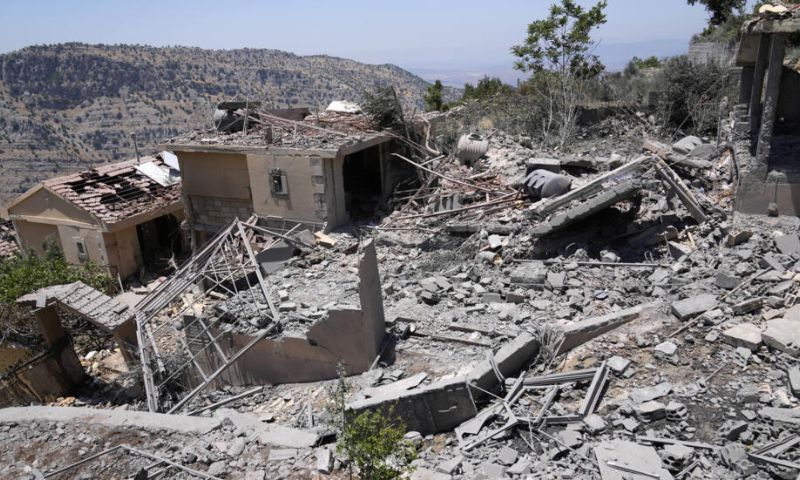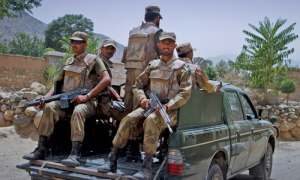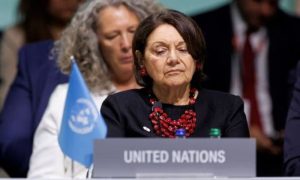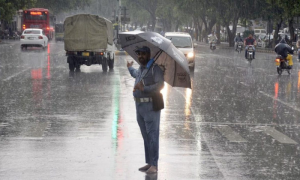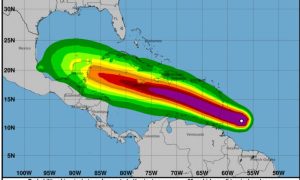TEL AVIV: Israel launched relentless air strikes on Gaza on Thursday after warning Hezbollah, Hamas’s ally in Lebanon, to avoid a large-scale war that would send the neighbouring country “back to the Stone Age”. The health ministry in Gaza reported that at least 37,765 Palestinians, mostly women and children, have been killed in ongoing relentless Israeli bombardment since October 7.
Israeli Defense Minister Yoav Gallant, during his visit to Washington, warned that any large-scale war initiated by Hezbollah would result in Lebanon being sent “back to the Stone Age.”
Gallant’s comments, made in the context of discussions about the ongoing Gaza war, efforts towards a truce, and measures to prevent a broader regional conflict, underscored Israel’s readiness to confront Hezbollah if necessary. “We do not want war, but we are preparing for every scenario,” Gallant emphasized.
Cross-border tensions between Israel and Hezbollah have been intensifying since October 7. Since then, near-daily exchanges of fire have occurred between Israel and Hezbollah. The situation further escalated after Israel declared that its war plans for Lebanon were complete, prompting threats from Hezbollah that all of Israel would be vulnerable in the event of a full-scale war.
US Defense Secretary Lloyd Austin, in his meeting with Gallant, warned of the “terrible consequences” a war with Hezbollah could have for the Middle East and urged a diplomatic resolution. UN humanitarian coordinator Martin Griffiths echoed these concerns, labeling Lebanon as the “flashpoint beyond all flashpoints” and warning that a full-scale war would be “potentially apocalyptic.”
In light of the escalating violence, Germany and Canada have advised their citizens in Lebanon to leave the country, reiterating warnings issued shortly after the October 7 attack. Recent clashes have seen approximately 10 Israeli air strikes near the Lebanon border, while Hezbollah claimed responsibility for six attacks on Israeli military positions on Wednesday.
Despite the rising hostilities, a US official noted that Washington was engaged in “fairly intensive conversations” with Israel, Lebanon, and other regional actors, expressing a belief that no party sought a “major escalation.”
Meanwhile, Israeli bombardment continued unabated in Gaza, with Prime Minister Benjamin Netanyahu’s recent comments about the “intense phase” of the war nearing an end offering little respite. Overnight and early Thursday, Israeli air strikes killed at least five Palestinians in Gaza City, according to the territory’s civil defence agency and Al-Mamdani hospital medics. Another Palestinian was reported killed in an Israeli bombing in Beit Lahia.
Heavy bombing, artillery shelling, and helicopter fire were reported in northern Gaza’s Shujayia market, where Israeli ground vehicles were advancing. Hamas’s press office in Gaza noted significant displacement of residents, with many fleeing to already overcrowded areas in Gaza City. Witnesses described the situation as “very difficult and frightening,” with residents running in terror and numerous casualties lying in the streets.
Further south, in Rafah, Israeli forces demolished several buildings, and in Khan Younis, the Israeli military reported attacking a school complex, with several bodies recovered by the civil defence agency.
The humanitarian situation in Gaza has reached a critical level, with hospitals struggling to operate and essentials such as food and water in short supply. USAID officials reported that only 1,000 of the 7,000 tonnes of aid shipped from Cyprus to Gaza had been distributed.
US medical personnel returning from Gaza described the dire conditions in stark terms. Former US Army combat surgeon Adam Hamawy, a volunteer medic, recounted the overwhelming number of civilian casualties, noting that most patients were children under 14. “This has nothing to do with your political views,” he said.
US officials, including Secretary of State Antony Blinken, have expressed hope that a ceasefire in Gaza could help de-escalate tensions along the Lebanese border. However, months of negotiations towards a truce and hostage release deal have stalled, with Israel rejecting Hamas’s demands for a permanent end to hostilities and a full troop withdrawal.









